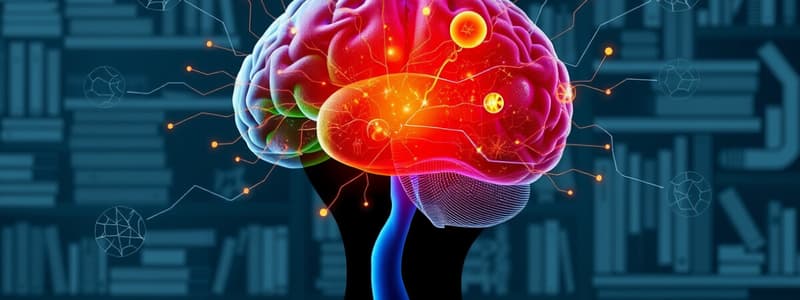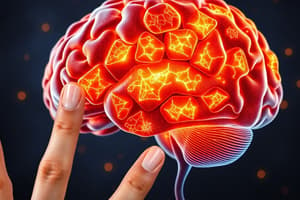Podcast
Questions and Answers
Learning is merely about retaining information.
Learning is merely about retaining information.
False (B)
What does neuroplasticity refer to?
What does neuroplasticity refer to?
The brain's ability to change physically as a result of learning.
What enhances focus according to the requirements for effective learning?
What enhances focus according to the requirements for effective learning?
- Studying at night
- Cramming
- Daily meditation (correct)
- Eliminating distractions (correct)
Deep sleep, especially ___, is crucial for solidifying learning.
Deep sleep, especially ___, is crucial for solidifying learning.
How many hours a day do high-performing students typically study?
How many hours a day do high-performing students typically study?
Cramming before deadlines is an effective study habit.
Cramming before deadlines is an effective study habit.
What study technique enhances retention by offsetting forgetting?
What study technique enhances retention by offsetting forgetting?
Using ___ can help gauge understanding and identify gaps.
Using ___ can help gauge understanding and identify gaps.
What is the duration of the recommended pause during study sessions to enhance comprehension?
What is the duration of the recommended pause during study sessions to enhance comprehension?
Intense emotions do not affect memory retention.
Intense emotions do not affect memory retention.
What can enhance the learning process according to emotional connection to learning?
What can enhance the learning process according to emotional connection to learning?
Flashcards are hidden until you start studying
Study Notes
Learning Fundamentals
- Learning is about offsetting forgetting rather than merely retaining information.
- Neuroplasticity refers to the brain's ability to change physically as a result of learning.
- Effective learning requires effort and friction; it is often difficult and not easy.
Requirements for Effective Learning
-
Focus:
- Active engagement with the material is critical; it changes neuronal connections.
- Self-talk influences focus; encourage positive internal dialogue to motivate learning.
- Daily meditation (5-10 minutes) can enhance focus by training attention.
-
Sleep:
- Deep sleep, especially REM, is crucial for the reorganization of neurons and solidifying learning.
- Avoid all-nighters as they prevent cognitive restructuring during sleep.
- Nonsleep deep rest (NSDR) allows access to deep learning states without sleeping.
Habits of High-Performing Students
- Study 3 to 4 hours a day, focusing on quality over quantity.
- Schedule study times to align with their peak focus periods during the day.
- Maintain zero distractions while studying—turn off phones and eliminate interruptions.
- Study consistently throughout the week rather than cramming before deadlines.
- Teaching others enhances understanding and reveals knowledge gaps; actively explaining material solidifies learning.
- Deep intrinsic motivation for studying is essential; relate studies to personal goals and interests.
Effective Study Technique
- Testing enhances retention and offsets forgetting by up to 50% compared to repeated studying.
- Studying material once and taking multiple tests proves more effective than repeated study sessions.
- Familiarity does not equate to mastery; testing helps ensure true understanding of concepts.
- Use active recall for self-testing, focusing on open-ended questions rather than just recognition tasks like multiple-choice questions.
- Regularly summarize learned material in one's own words to gauge understanding and identify gaps.### Effective Study Techniques
- Self-testing enhances learning retention more than passive review. Engaging with the material repeatedly keys into memory.
- Mistakes signal the need for improvement. Wrong answers foster deeper learning and should not diminish confidence.
- Regularly using past papers or question banks is advised for effective self-assessment.
The Gap Effect
- Pausing for 5 to 30 seconds during study sessions allows the brain, particularly the hippocampus, to consolidate and review material.
- This technique involves consciously stopping to reflect rather than continuously reading, enhancing overall comprehension and retention.
Emotional Connection to Learning
- Emotions significantly influence memory retention; intense emotions often lead to stronger recollection.
- Positive emotional states like excitement and curiosity improve the ability to learn and understand new information.
- Effective teaching that generates enthusiasm can enhance the learning process.
Practical Tips
- After studying, take a moment to summarize and identify knowledge gaps before revisiting the material.
- Consider engaging with content that excites and interests you to capitalize on emotional learning benefits.
Learning Fundamentals
- Learning offsets forgetting instead of just retaining facts; retention alone is insufficient.
- Neuroplasticity signifies the brain's physical changes due to learning experiences.
- Effective learning entails effort and friction; it tends to be challenging rather than straightforward.
Requirements for Effective Learning
- Focus:
- Active engagement alters neuronal connections, crucial for deeper learning.
- Positive self-talk can enhance focus and motivation during study sessions.
- Daily meditation for 5-10 minutes promotes improved attention span.
- Sleep:
- REM and deep sleep are vital for reorganization of neurons and reinforce learning.
- All-nighters disrupt cognitive restructuring and hinder learning retention.
- Nonsleep deep rest (NSDR) can mimic deep learning states without actual sleep.
Habits of High-Performing Students
- Spend 3 to 4 hours studying daily, emphasizing quality rather than quantity.
- Schedule study sessions according to peak focus intervals for maximum productivity.
- Minimize distractions by turning off phones and creating a focused environment.
- Favor consistent studying throughout the week over last-minute cramming.
- Teaching others clarifies concepts and reveals knowledge gaps, boosting retention.
- Strong intrinsic motivation is key; connect subjects to personal interests and goals.
Effective Study Techniques
- Testing boosts retention rates by 50% compared to simple repetition of the material.
- One-time study followed by multiple tests proves more effective than multiple study sessions.
- Mastery involves true understanding; familiarity doesn't ensure it.
- Active recall prioritizes open-ended questions over recognition tasks like multiple-choice.
- Summarizing learned material in personal phrasing aids in assessing comprehension and identifying gaps.
The Gap Effect
- Brief pauses (5 to 30 seconds) during study sessions improve consolidation and review by the brain, especially the hippocampus.
- Reflective pauses enhance comprehension and retention by promoting active engagement.
Emotional Connection to Learning
- Emotions play a crucial role in memory; strong feelings boost the ability to recall information.
- Positive emotions like excitement and curiosity facilitate learning and comprehension.
- Enthusiastic teaching approaches can significantly enhance the learning experience.
Practical Tips
- After studying, summarize the material and pinpoint knowledge gaps to revisit later.
- Engage with stimulating and interesting content to leverage emotional benefits in learning.
Studying That Suits You
Use AI to generate personalized quizzes and flashcards to suit your learning preferences.



